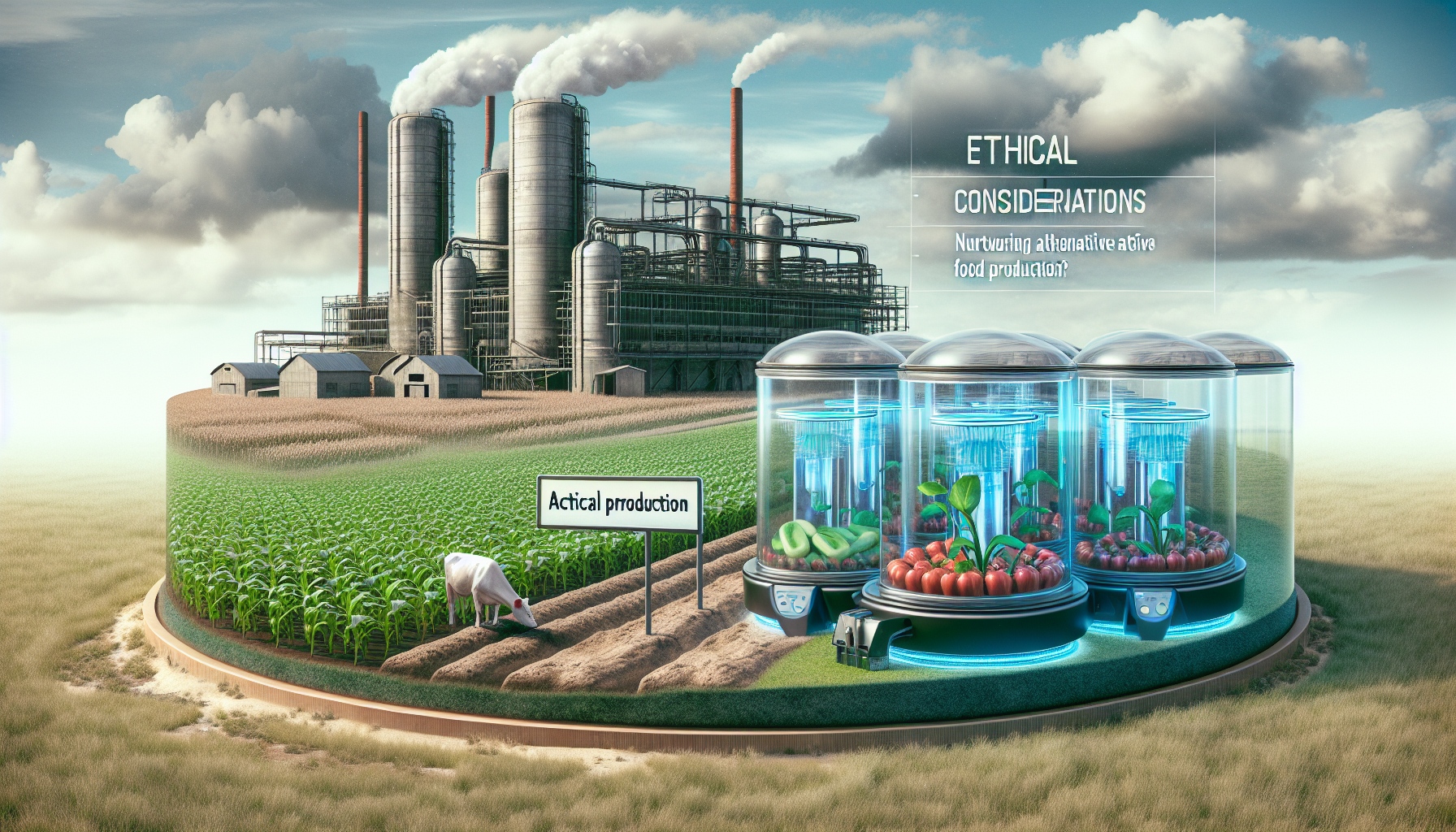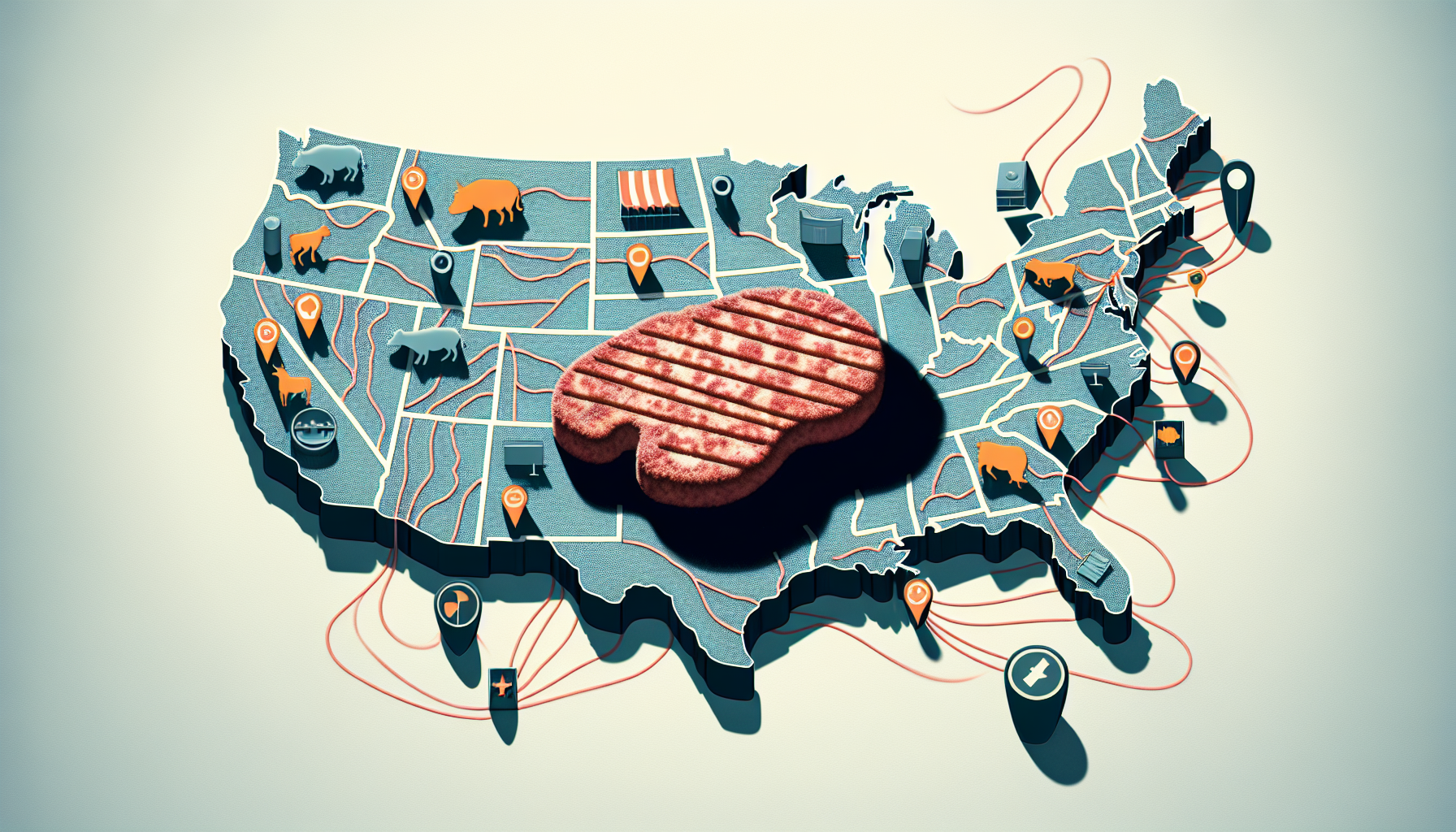Exploring Why Lab Grown Meat is Getting Banned in Alabama: A Deep Dive into New Legislation

Are you wondering why lab-grown meat is getting banned in Alabama? Look no further. In this article, we delve into the state’s decision to forego the lab-grown meat industry, highlighting the concerns of Alabama’s legislators and traditional farmers about market disruption and cultural integrity. Without revealing all, we offer a clear view into the complexities driving this controversial ban.
Key Takeaways
- Alabama’s recent legislation bans the manufacture, sale, and distribution of lab-grown meat, classifying its sale as a criminal act, with potential civil penalties, disciplinary actions, and revocation of food safety permits.
- The ban in Alabama reflects concerns for traditional agricultural practices and local farmer interests, raising debates over consumer choice and the role of innovation in the U.S. food industry.
- The regulatory stance on lab-grown meat varies globally, with the U.S. playing a pivotal role in the international food market, and states like Alabama influencing national agricultural policy and market competition.
The Heart of the Ban: Alabama's Stance on Cultivated Meat

Alabama’s decision to place a ban on lab-grown meat is rooted in a desire to shield its agricultural heritage from the burgeoning wave of high-tech food companies offering cultivated meat products. This protective stance follows in the footsteps of Florida, with both states seeking to preemptively curb any market disruptions that could arise from these novel food sources.
Appreciating Alabama’s viewpoint, especially in the southern portion, allows us to grasp the delicate balance the state seeks to maintain between safeguarding traditional practices and exploring the potential for agricultural evolution.
The Legality of Lab Grown Meat
Alabama’s legal framework now clearly defines cultivated meat as any food product derived from cultured animal cells. The recent legislation signed on May 7, 2024, by Governor Ivey, crystallizes the state’s position, making it clear that the manufacture, sale, or distribution of these products is now off the table. The consequences for flouting this law are substantial, with the potential for civil penalties, disciplinary actions, and even the suspension or revocation of food safety permits.
Moreover, companies or individuals caught selling cultivated meat in violation of the ban could find themselves facing a Class C misdemeanor.
Protecting Traditional Agriculture

The prohibition of lab-grown meat represents a call to arms in defense of the interests of cattle ranchers and farmers across Alabama. This defensive measure protects cattle ranchers by anchoring the state’s economy in its agricultural roots, ensuring that land and resources continue to support the farmers and ranchers who have long been the backbone of local food production. The Alabama Cattlemen’s Association has endorsed the ban, emphasizing their dedication to high-quality beef and the necessity of consumer access to authentic beef products.
Alabama’s approach may also set a trend, with other states considering similar protections for their agricultural sectors.
Economic Implications
The ban’s economic repercussions are multilayered, potentially disrupting the market and significantly impacting traditional agriculture. Critics argue that the ban curtails consumer choice and criminalizes innovation in agricultural technology, which could otherwise offer environmental and animal welfare benefits. However, an exception within the legislation allows higher education institutions and government departments to research cultivated meat, hinting at a nuanced stance toward the future of food production.
A company specializing in cultivated seafood expressed concern over the ban, fearing it infringes upon citizens’ rights to choose food alternatives free from environmental contaminants. Conversely, supporters of the ban contend that it holds traditional agriculture accountable and prevents it from competition, emphasizing the importance of maintaining the status quo.
Navigating the Controversy: Stakeholder Perspectives
The heated debate surrounding lab-grown meat in Alabama reflects a broader national conversation about the place of alternative proteins in American agriculture. While the ban has garnered support from local farmers and ranchers, it has also faced opposition from major meatpackers represented by the Meat Institute, who see it as a policy that unfairly limits consumer choice and hinders innovation.
Examining the differing viewpoints of stakeholders involved in this controversy reveals a rich blend of anxieties, aspirations, and ambitions.
Farmers' Fears and Hopes

For local farmers and cattle ranchers, the ban represents a shield against the competitive threat posed by alternative proteins. Particularly in Southern Alabama, where traditional livelihoods are deeply intertwined with agriculture, the measure is viewed as essential for preserving a way of life.
Traditional meat producers are evidently worried about losing market share to lab-grown meat, and a considerable number see the ban as a crucial step to safeguard their interests.
Science and Innovation Response
In stark contrast to the relief felt by traditional farmers, companies at the forefront of food technology, such as Upside Foods, have criticized the ban for ignoring scientific expertise and hampering American innovation in the food sector. These companies are not sitting idly by; instead, they are ramping up their efforts in scaling and product development, and even initiating consumer-targeted petitions to fight against governmental restrictions on food choices.
The industry remains focused on overcoming scalability and economic viability challenges through innovation, such as developing plant-based culture mediums, to ensure sustainability and adoption. Despite the ban, lab-grown meat has the green light from the USDA for sale in the U.S., although its market availability is still limited as it remains in a developmental phase.
Consumer Reception
Alabama’s ban has not gone unnoticed by its citizens, with some social media users decrying it as ‘anti-free market’ and championing cultivated meats as an environmentally sustainable alternative to conventional livestock. National advocacy groups have echoed this sentiment, claiming the ban infringes on consumer freedom and impedes agricultural innovation.
Reflecting these concerns, a petition has been launched by Alabama residents to overturn the ban and preserve their autonomy in food choices, highlighting the critical role of consumer demand in shaping the future of food production.
Environmental and Ethical Considerations
The controversy around cultivated meat extends far beyond the borders of Alabama, touching on critical environmental and ethical issues that resonate globally. Conventional livestock production, with its hefty environmental footprint including greenhouse gas emissions, land degradation, and water resource depletion, contrasts sharply with the promise of lab-grown meat as a potential remedy.
The ethical angle is equally compelling, as lab-grown meat offers a future where the suffering of animals for meat production could be significantly reduced. These arguments for and against lab-grown meat contribute to a broader dialogue on how we can produce food sustainably and ethically.
Sustainable Solutions or Not?
Advocates for lab-grown meat hail it as a sustainable alternative that demands fewer resources in terms of land, water, and greenhouse gas emissions compared to traditional farming methods. However, the environmental benefits of lab-grown meat are a subject of scientific debate, with studies offering mixed conclusions and raising questions about the long-term outcomes. A study from the University of California Davis, for example, suggests that lab-grown meat could have a higher carbon footprint than traditional cattle farming, indicating that the touted benefits may not be as substantial as some claim.
The bans in Alabama and other states:
- Limit consumer choice
- Could be seen as a criminalization of agricultural innovation
- Potentially stall the progression of lab-grown meat as a sustainable solution.
Ethical Eating

The potential of lab-grown meat to diminish the amount of animals butchered for meat production presents a significant ethical consideration for numerous consumers. However, ethical concerns also arise from the production of cultured meat, particularly regarding the use of fetal bovine serum, which involves the harvest of blood from calf fetuses.
Yet, the overarching goal of cultivating meat in labs is to address the environmental and ethical challenges of traditional farming, potentially leading to a future with less animal suffering and environmental degradation.
Regional Ramifications
Alabama’s prohibition on lab-grown meat doesn’t stand alone; it has elicited varied responses across different regions within the state and beyond. In areas with a strong agricultural presence, support for the ban is robust, while regions with emerging food tech industries voice concerns over its impact on innovation and economic growth.
Legal experts speculate that Alabama’s legislative move could inspire similar initiatives in other conservative-leaning states that prioritize traditional agriculture. This speculation is supported by the potential domino effect, with states that have significant agricultural sectors considering comparable legislation to protect their industries.
As Alabama bolsters its conventional meat production, pressure mounts on regions that were previously exploring alternatives to traditionally produced meats.
Northern Florida and Southern Alabama
The prohibition on lab-grown meat is likely to shape the market dynamics between Northern Florida and Southern Florida, as well as Southern Alabama, regions linked by geographical closeness and interwoven consumer bases. Florida’s Governor DeSantis has aligned his policies with Alabama’s, both showing a commitment to supporting traditional agricultural practices, including the ban on lab-grown meat.
This alignment may lead to changes in how businesses operate across the continental United States, affecting everything from product availability to consumer preferences in these closely connected areas.
Impact Beyond State Lines

The ripple effect of Alabama’s ban on lab-grown meat is not confined to its borders. Other states, recognizing the precedent set by Alabama, are now contemplating similar prohibitions on lab-grown meat, indicating a potential shift in national agricultural policy. This legislative trend suggests that more stringent regulations may emerge across states with different political alignments, as they grapple with how to address the growing presence of alternative meat producers.
The regional influence of Alabama’s decision is further underscored by Florida’s Governor, Ron DeSantis, who has framed the state’s lab-grown meat ban as a defense against global efforts to undermine traditional agriculture and Florida’s economy, particularly in the southeast Florida and southwest Florida regions.
Legal and Legislative Insights
Alabama’s ban on lab-grown meat provokes numerous legal and legislative queries, potentially leading to consequences that reach beyond instant food safety permits and regulations. Following Florida’s lead, Alabama has made the sale of lab-grown meat a misdemeanor offense, officially categorizing it as a criminal act. This decision by the Governor of Alabama has introduced a new dimension to the state’s legal landscape, one that could have far-reaching effects for:
- the food industry
- consumer choice
- technological innovation
- economic development
and beyond.
Chief Legal Officer's Perspective
While Alabama’s Chief Legal Officer has remained silent on the ban, legal authorities in the food tech industry have been vocal in their criticism. Sean Edgett, the chief legal officer of Upside Foods, has decried the bans imposed by Alabama and Florida, arguing that they neglect scientific expertise, limit consumer choices, and impede American innovation.
The lack of public commentary from Alabama’s Chief Legal Officer leaves room for speculation about the state’s legal justifications for such a controversial stance.
Future Legislative Developments
While Alabama Senate Bill 23 casts a shadow over the future of cultivated food products in the state, it notably leaves the door open for ongoing research and development in the field. This complex legal landscape will likely increase the workload for state departments such as Public Health and Agriculture and Industries, which are tasked with fleshing out new regulations to enforce the ban.
The legal ramifications of this bill are set to come into full effect in October 2024, with any violations incurring misdemeanor charges and the possibility of severe consequences for food establishments like permit suspensions or revocations. The enforcement of this new law could also spell financial consequences for the state, with potential revenue increases stemming from fines, court costs, and civil penalties associated with breaches of the ban.
The Global Context
Alabama’s prohibition on lab-grown meat emerges at a juncture when global regulations of such products are in a state of transition. While the U.S. grapples with the implications of this new legislation, other countries are taking varied approaches to managing lab-grown meat products. The EU is currently assessing the regulation of lab-grown meat, and the novel foods legislation could provide a relevant framework, while Singapore stands as the first country to approve the sale of lab-grown meat, signaling a significant milestone in the international market.
These developments underscore the United States’ influential role in food technology and the potential effects of Alabama’s decision on the nation’s standing in this field. The global perception of lab-grown meat as an industry with potential economic benefits makes the regulatory moves in Alabama all the more consequential for market competition.
International Regulations on Cultivated Meat
Across the international landscape, the regulation of cultivated meat varies significantly, with countries adopting their own stances on lab-grown meat products. Some notable examples include:
- Singapore’s groundbreaking decision to approve lab-grown meat in 2020 paved the way for the industry.
- The Netherlands is the first EU nation to allow pre-approved tastings of lab-grown meat and seafood.
- A coalition of European Union member states is calling for a public debate on the topic.
The European Union’s process for approving novel foods, including cell-cultured meat, is lengthy and complex, potentially spanning over two years with additional time required for further testing. Religious considerations have also entered the discourse, with Jewish and Islamic authorities deliberating the compliance of cultured meat with dietary laws.
America's Position in the Global Food Industry
As a nation that has long supported global food security through various means, including capacity building and research, the United States plays a pivotal role in the international food market. The country’s agricultural exports to developing countries have surged, further cementing its position as a key player in the global food industry. The USDA’s active engagement in over 80 countries to monitor agricultural matters reflects America’s extensive involvement and influence in global food affairs.
With countries like China including investments in cultivated meat research as part of their five-year agricultural plan, the global trend towards alternative protein development is clear, and the U.S. is poised to play a significant role in this arena. Additionally, investments by Middle Eastern countries such as Qatar in cultivated and plant-based meat technologies to secure their future food systems amid agricultural challenges may influence U.S. strategies in alternative protein markets.
Summary
As we reach the end of our exploration into Alabama’s ban on lab-grown meat, the complexity of the issue is undeniable. From the local economic and cultural defense of traditional agriculture to the global implications for innovation and sustainability, the decision carries weight far beyond the borders of a single U.S. state. The ban has sparked a lively debate among stakeholders, with farmers, food tech companies, and consumers each presenting their own case for or against the legislation. Environmental and ethical considerations add further layers to the discussion, as the potential benefits of lab-grown meat are weighed against the current realities of livestock production. The regional and legal ramifications reveal a state wrestling with the future of food production and a nation that could shape the international approach to alternative proteins.
This conversation is far from over, as the implications of the ban will continue to unfold in the coming years. As we watch Alabama’s decision play out, it will be crucial to keep an eye on how it influences legislation in other states, the evolution of global food industry regulations, and America’s role in the burgeoning lab-grown meat market. One thing is certain: the choices we make today about how we produce and consume meat will shape the future of our planet and the ethical landscape of our society. With that in mind, may this deep dive into the heart of Alabama’s ban on lab-grown meat serve as food for thought, inspiring continued dialogue and thoughtful consideration of where we go from here.
Frequently Asked Questions
Why did Alabama ban lab-grown meat?
Alabama banned lab-grown meat to protect its traditional agricultural sector from competition posed by cultivated meat products, following a similar precedent set by Florida.
What are the legal consequences of selling lab-grown meat in Alabama?
Selling lab-grown meat in Alabama is classified as a Class C misdemeanor and can lead to civil penalties, disciplinary actions, and the suspension or revocation of food safety permits. It's essential to be aware of the legal consequences for this action.
How does the ban affect consumer choice and innovation?
The ban limits consumer choice and criminalizes innovation in agricultural technology, potentially hindering environmental and animal welfare benefits.
Are there environmental benefits to lab-grown meat?
Lab-grown meat has the potential to offer environmental benefits, such as requiring less land, producing fewer greenhouse gases, and consuming less water, but the extent of these benefits is still under debate.
Could Alabama's ban on lab-grown meat influence other states or countries?
Yes, Alabama's ban on lab-grown meat could potentially inspire other states and even impact international investment and trade relations in the food industry. This could have broad-reaching implications.
